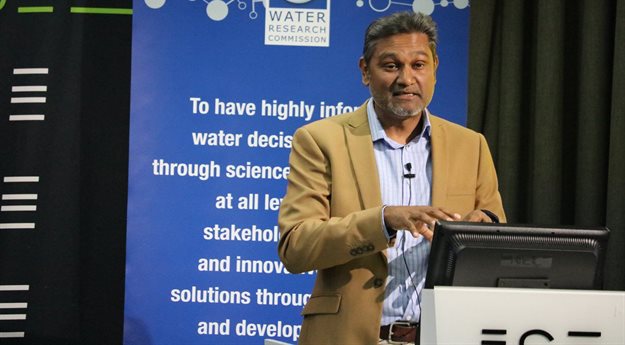Marketing & Media trends
Industry trends
BizTrends Sponsors
#BizTrends2020: Route to water prosperity - new perspectives for 2020

This physical phenomenon of extreme weather, which is rapidly defining our new normal, is greatly exacerbated by the metaphoric drought of ideas and imagination compounded by the floods of prejudice and negativity. This is particularly pronounced in the commentary of some regular water and development experts that fill our media spaces - a clan of Afro-pessimists in general and South African nay-sayers.
Highly productive research community
One of the questions raised in response to the launch of the Water Masterplan by Minister Lindiwe Sisulu was “where would the water come from?” South Africa has the accolade of being in the world’s top 10% of water knowledge producers on the back of a highly productive research community of practice, so let us assist in hydrating this drought of ideas. Accepting that the public is aware of the plans for various surface water augmentation schemes of dams and pipelines in progress at the Department of Water, lets concentrate on the other even more attractive options.
Firstly, we have the potential of sustainable groundwater harvesting from renewable aquifers of between 8 to 12 billion cubic metres annually. Our current use is only between 2 and 4 billion cubic metres depending on the season. Core to the sustainability of this resource is frequent and regular replenishment. Groundwater also trumps surface water storage as it is largely immune from the evaporation index. A great example is the Atlantis aquifer outside Cape Town which is being replenished with a combination of stormwater and treated wastewater. Its current potential for supply is 15-20 million litres a day.
Desalination investments
A further unexploited resource is seawater along the coast and brackish and polluted waters inland. The traditional barrier to entry of energy demand has been largely solved by technological advancement and renewable energy options, and costs will depend on economies of scale on the one hand and the planning model on the other. Desalination investments could easily decrease the current strain on surface water systems by at least 10%. For this to work it is essential that desalination plants are retained as a permanent part of the water mix and not only for emergencies. The possibilities were shown in the Ndlambe district municipality in the town of Albany in the Eastern Cape where Minister Sisulu launched of the next phase of its desalination, now utilising a sand water harvesting system to supplement the seawater feed. The town is now predominantly supplied with these sources supplemented by rainwater harvesting tanks. It is, if you like, an off-the-surface water grid.
Reticulation efficiency
The quickest win of all lies in reticulation efficiency. We currently lose about 25% of treated, expensive drinking quality water to leaks in our cities and towns. One out of every four litres of water is lost before it reaches the tap. A dramatically reimagined “war-on-leaks” initiative designed to build the plumbing capacity we need, supporting entrepreneurs to permanently provide this service to maintain the reticulation systems and the use of the latest technological platforms including drones and robotics will not only win back the 25% of water currently lost, but will support an industry platform that will provide livelihoods and economic growth in an inclusive manner. This is not pie-in-the-sky, the Water Research Commission in partnership with the African Development Bank, has successfully piloted the social franchising model for school sanitation maintenance in the Eastern Cape, creating in the process 20 new companies employing at least three people each now active players in the industry. This is model that can easily operate with similar efficacy and effectiveness in addressing the water leaks challenge.
If we delve deeper into the new non-sewered sanitation technologies, we have the potential to save 30% of water in every household and workplace in the country. What we observed when launching the second phase of the SATEP (SA Sanitation Entrepreneurship Programme) with the WRC’s partners – the SA government and the Bill and Melinda Gates Foundation, was the high interest from both the business sector and the investment community. We add to this scaled recycling systems as part of the global purple pipe revolution where up to 80% of water in an average household can be reused for further purposes.
Towards water prosperity
The water arithmetic now begins to look very positive. In fact, with these demand management interventions we can easily reduce South Africa’s per capita use from its current 253l/person/day to the global average of 173l/person/day. This will be an immediate saving of 30% overall. If we move to the global best practice of 108l/person/day, as claimed by the likes of Denmark, then an amazing 57% of the current water asset will be available for new use. We will be in the realm of water prosperity. That is where the water will come from, even before you consider the classical augmentation schemes.
Flood of bigotry and prejudice
Let us address the other side of the coin – the flood of bigotry and prejudice infused with a deep Apartheid nostalgia garnished with thinly veiled hyper-privilege. That the current water woes are only there because there are new folk, black folk, in charge, completely ignores the fact that the notion of a water crisis has been in the top five risks in the World Economic Forum’s Global Risk Register for nine years continuously; that the vagaries of extreme weather events and climate change is driving two thirds of the world to water stress. No, it must be a lament on the loss of skills in the water sector - of course in particular the white male skills base.
Let us remind ourselves that the great efficiency of water services that these folks long for was one in which only 58% of South Africans had access to safe water and far fewer had the benefit of dignified improved sanitation. In short, the nostalgia is not shared. Also, the comments are not only deeply insulting to the millions of men and women, black and white, that put their best foot forward every day, toiling hard to provide for their families while keeping SA Inc ticking over, this expression of hyper-privilege has become a major hurdle to the Mzansi Social Democracy project. In 2011, 80% the WRC’s research portfolio was led by white male researchers, today the majority of projects are led by women and black researchers. The key enabler to this great transformation story was in fact the generosity and willingness of the older white male researchers to come on board as the mentorship group to enable this very important change.
Unity is indeed strength
The future is not what it used to be. When we were pegging our hopes on 2020 in the 1990s, we were in the middle of what Clem Sunter labelled the long (economic) boom. Our optimism was further driven by our own liberation from Apartheid and our re-entry into the global community of nations. The fact that the Kyoto Protocol was still the main game in town added to our positive views that we had a handle on making the world a much better place for future generations. Much has changed and the world has become a much more challenging place. Let us now reflect on the South Africa we really want and whether our current actions help us to get to the right space or is it taking us the other way. If there was one truism worth repeating from the Apartheid era it is “Eendragt maakt magt”, a national motto shared with several countries. Unity is indeed strength! A Mzansi united is the only way we can navigate our way out of the doldrums into prosperity.





